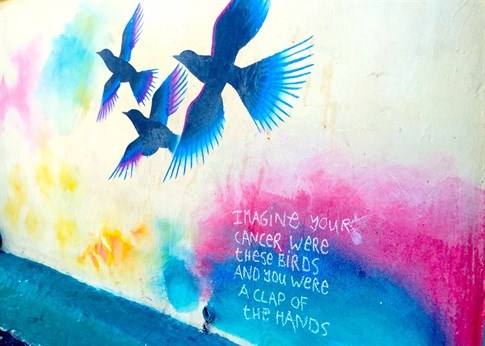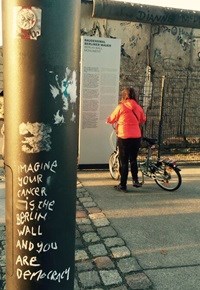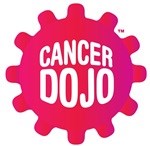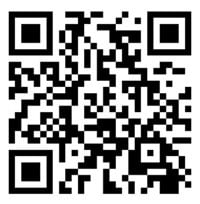Bertish is a cancer survivor. A Dunlop squash ball-sized tumour was removed from the back of his brain, with a similar 'pressure hole' drilled in the front - so when he's not wearing his standard porkpie hat, you notice there's something different about him. Adults are usually too polite to comment, but kids are great - they come up to him in shops, stare a while then point out there's a dent in his head. Bertish plays along by feigning surprise each time and feeling the back of his skull. But it was only through his own vigilance and sinking feeling that something was wrong that his cancer was discovered in the first place. He'd been having sharp headaches, which doctors pinned down to stress - after all, advertising is often quoted as one of the most stressful careers. But it was more than that. He started tripping over nothing. Slurring a few words. Feeling uneasy in his own skin, it was while taking down a phone message for his wife that the blinkers truly came off - no matter how hard he concentrated, he simply could not form the number '8' - it kept coming out as a '9' on the page. Terrified, the father of two insisted on further tests, and was booked in for emergency surgery the next day.
But it's not the fact that Bertish went through the surgery with ease that makes his story stand out - it's how he 'prepped his brain' for the process that's got people taking note. Bertish decided to imagine his brain as most flexible thing, bouncy like Magic Putty, to minimise his fears and enhance the chance of complete healing. The reason? "True creativity is about being agile, being able to work with what happens, when it happens," Bertish explains. He even demonstrated the 'Gwongggg' noise he imagined for the bouncing brain before being wheeled into surgery. This was a good move, as he had to wait for five endless days to pass post-surgery to even find out what kind of cancer he'd had. It turned out to be a very rare form that mainly affects children. He then went the traditional treatment route of chemotherapy, radiation, and of course the double surgery. But it's his storified visualisation techniques that played the most part in his recovery.

Bertish was keen to put his brain to work as it's what was affected by the cancer, so only fitting that it played a role in his recovery too. And so he created visual stories to help him engage with the cancer in a way that made it fun, and silly and easy to visualise. This augmented the effect of the treatments, workingwith them, as opposed to just being a helpless patient at the mercy of the medicine. But it didn't end there. As a creative director, Bertish has long studied other people and how they behave, which is one of the reasons he's in advertising.
During his cancer he created portraits of people around him on sticky notes, with around 120 in total as he started to use the world around him as a metaphorical healing playground. Now, he wants to take things further, by making his stories downloadable and even Gamifying them. He wants to harness how creative thinkers can make disease 'visible and engaging' to help others, who are not visual thinkers, overcome their fears, thereby enabling them to become a part of their own healing process, as opposed to just being passive and negatively affecting their immune systems. That is a long story cut (relatively) short, on how and why Bertish has decided to shift from the traditional advertising industry to build a new model of social enterprise. One where brands, ad agencies, corporates and governments can collaborate to build a digitally based creative healing platform that in his words, "will increase the global cancer survival rate". Bertish has found his purpose. He has decided to focus his work hours on creating an app that helps cancer patients deal better with their treatments, harnesses the science of psychoneuroimmunology and the playful 'Dojo Thinking' approach in a virtual, mobile driven community space.
I chatted to Bertish for over an hour, my hot chocolate went cold and I still didn't reach the crux of my questions - luckily he's answered them below...
 1. Tell us more about your ad agency/cancer link, as defined in 'How Conn solved his own cancer brief'.
1. Tell us more about your ad agency/cancer link, as defined in 'How Conn solved his own cancer brief'. Bertish: As an advertising creative director, I've always tried to solve problems in an interesting way, and as much as possible, in a way that hasn't been done before. I believe in the old-school method acting approach to solving tricky briefs: to immerse oneself in the problem. Be a part of it, understand the intricacies but not get swamped by the details, timelines and budgets. The job is always a human one - how do I connect with the audience in the appropriate way to engender a positive change of perception.
So when I was diagnosed with cancer, I viewed the problem as something I needed to solve. It was like the most terrifying brief I had ever been handed - but this is why we're all in this industry. It's the ultimate challenge, of every brief, big or small. How do we solve it?
So I approached cancer the same way I do most briefs or tricky situations: I started playing with it, flipping it on its head, teasing it, simplifying it, debunking it, scribbling and messing with it. I began using my scribbles to connect my head to what was going in my body; then began using the world around me as my metaphorical playground for other mind-body cancer imaginings and immune boosting actions. I tried to have fun with it, even gave my tumour a name - Mickey, Mickey the tumour. And I was going to do just that, take the Mickey out of it.
 2. What are some of your biggest accomplishments from your career?
2. What are some of your biggest accomplishments from your career? Bertish: This is. What I'm doing right now. I've resigned from my role as Executive Creative Director of Quirk Cape Town to make this idea a reality. As creatives, we all have those big ideas we wish we could make happen. This is one that I have to listen to, it's part of who I am and why I'm still here. So I've committed. I'm in, come hell or high water.
But my history is that I've worked at a range of amazing agencies and performed the role of Executive Creative Director at Saatchi & Saatchi Cape Town, JWT Cape Town and Quirk Cape Town. I've won the big awards at all the international shows, including a yellow pencil at D&AD, golds at Clios, One Show and Lions at Cannes, where I have also performed the role of judge. I've sat on the JWT global creative council and the board of Africa's largest digital agency. I've paddled into some of the biggest waves in Cape Town and exhibited my art in New York. I have an amazing family, I beat cancer and I found my purpose. I am writing a book. I am alive.
 3. What's most important to you in life?
3. What's most important to you in life? Bertish: My family, the power of creativity, nature and the ocean.
 4. How did your cancer experience change you?
4. How did your cancer experience change you? 
Bertish: Cancer softens you. It exposes the gnarls and imperfections in yourself. It gives you the most intense kick in the arse on the planet. It redefines what is important. It made me realise that we as creative people take for granted the insanely powerful talent we possess for playing and doing and making: The ability to make things exist that didn't exist before.
It led me to understand that creative thinking is more important now than ever before in human history. And we, the misfit problem solvers, are the ones that need to step up and play a role in the bigger world issues, because in the famous words of the iconic 1997 Apple commercial, "The people who are crazy enough to think they can change the world, are the ones who do."
Big problems demand playful thinkers who are crazy enough to think they can solve them: To provoke, debunk and ultimately propose a new way of doing things. Cancer not only made me realise what was important, it also made me realise how the broader creative community can affect positive change on a global level.
And this is where the future of advertising lies - brands need to start solving big global issues that are relevant to their core beliefs. Organisations that have skinny and weak purposes purely determined by the bottom line will fall. Social media in its ever-growing all-pervasiveness will spit them out as soulless dinosaurs from a bygone era. Brands need to solve human problems, and the people they serve should be at the heart of their DNA, their purpose.
So I'm excited about where advertising is going; it's a whole new landscape of positive problem solving on a massive level. What better time to start a collaborative non-profit social enterprise tackling the world's most feared disease with creativity, technology, science and brand partners.
 5. Indeed. Explain 'Dojo Thinking' to us.
5. Indeed. Explain 'Dojo Thinking' to us. 
Bertish: Dojo Thinking is a playful, irreverent approach and attitude to facing big, hairy and seemingly serious problems. It's a way of actually confronting your fear of things and then putting them into the context they deserve. This kind of thinking has well documented physical, psychological and immune boosting qualities that can not only make you stronger during a difficult time, but can enable you to view the world in a fresh way that may very well deliver you the solution to something that seemed impossible or out of your grasp. It also makes life more fun, what a bonus!
 6. What did it take to do more than just 'be strong' and creatively become part of the solution?
6. What did it take to do more than just 'be strong' and creatively become part of the solution? Bertish: I think there is a lot of rhetoric around dealing with cancer - many people give you the advice to 'be strong' or 'tough' or just 'be positive', but really what does that mean? How do you just be strong? Or positive? Cancer is a killer, it's insanely hard to just be strong and positive, especially as the treatments are so protracted and invasive. What people really need, are tools and techniques that can help them achieve these attitudes of resilience, which will ultimately give them a better chance of surviving. And this is the nub of Cancer Dojo.
 7. Did your drawings inspire others? What's the reaction been?
7. Did your drawings inspire others? What's the reaction been? 
Bertish: People are amazed when they see them. I must say I felt a little insecure about sharing them at first, because they were pretty silly and I never thought I would be sharing them publically, but people are so amused and somewhat astonished when they realise that your mind and body are one thing, and that the simple act of scribbling something on a piece of paper that helps you engage with own self is actually a remarkably powerful action, because it engenders an actual link between your mind and your body, and it carries intent. My drawings are really a creative playful method of mindfulness with a purpose.
 8. Cancer Dojo has been mentioned on a few prominent blogging spaces. How has the message been spread?
8. Cancer Dojo has been mentioned on a few prominent blogging spaces. How has the message been spread? Bertish: I have some great collaborators and team members, all connected and affected by cancer. They are the real deal, have fires burning in their hearts and are committed to helping others through a very difficult time.
Another reason is that we all share cancer; its fears, threats, heartbreaks and suffering, but we also all share its hope and survival and stories of life and new ways to overcome it or embrace it. There has never been a better time in history for a shift in the way we as humans view and deal with disease. This is why I have been really excited about the amount of support I've received from the medical fraternity who have all expressed the need for a creative layer to medicine, one that humanizes and empowers and adds to the healing process.
Science, technology and creativity are going to transform our world for the better - and I want to be a part of ideas like Cancer Dojo, to lead the way.
 9. Tell us more about ThundaFund and how our readers can help.
9. Tell us more about ThundaFund and how our readers can help. Bertish: We are crowd funding to build Cancer Dojo, an online platform and mobile application that will enable people facing cancer to augment the traditional treatments of surgery, radiation and chemotherapy with another layer, that of a psychoneuroimmunological approach - one that positively enables the neuroscience of how your brain affects how your body behaves.
To create the kind of content, animation, gamification and community tools necessary for Cancer Dojo to be successful, we need funding, so we are working with South African based Thundafund (an online crowd-funding website). There are many ways you can contribute, online, by EFT, or with the handy Snapscan code embedded below.

Bertish's final words to the ad community are strong: We need all the help we can get to increase the global cancer survival rate, so get involved, dig deep, become a partner and let's build it.
Doctors agree, with Dr Tom Sutcliffe, The Red Cross Children's Hospital Trustee and former Head, Western Cape Government: Health calling Cancer Dojo: "A brilliant app that helps a lay person to understand and to thoroughly engage with his or her cancer on a creative, self-healing path."
If you need more insight, you can watch Bertish talk through his incredible recovery in a recent video interview with News24.
